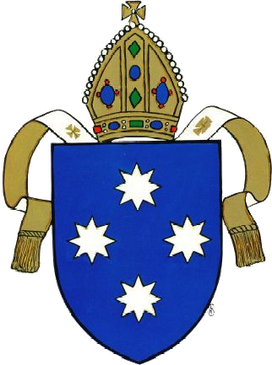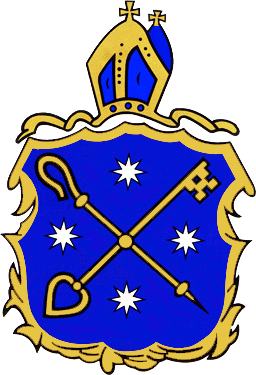Related Research Articles

The Diocese of Sydney is a diocese in Sydney, within the Province of New South Wales of the Anglican Church of Australia. The majority of the diocese is evangelical and low church in tradition.

Trinity College is the oldest residential college of the University of Melbourne, the first university in the colony of Victoria, Australia. The college was opened in 1872 on a site granted to the Church of England by the government of Victoria. In addition to its resident community of 380 students, mostly attending the University of Melbourne, Trinity's programs includes the Trinity College Theological School, an Anglican training college which is a constituent college of the University of Divinity; and the Pathways School which runs Trinity College Foundation Studies and prepares international students for admission to the University of Melbourne and other Australian tertiary institutions, as well as summer and winter schools for young leaders and other short courses.

Peter Frederick Carnley is a retired Australian Anglican bishop and author. He was the Archbishop of Perth from 1981 to 2005 and Primate of the Anglican Church of Australia from 2000 until May 2005. He ordained the first women priests in Australia. In the 2007 Queen's Birthday Honours list, he was appointed a Companion of the Order of Australia. He is married to Ann Carnley. He also founded the school Peter Carnley Anglican Community School.

The Australian College of Theology (ACT) is an Australian higher education provider based in Sydney, New South Wales. The college delivers awards in ministry and theology. It is now one of two major consortia of theological colleges in Australia, alongside the University of Divinity. Over 23,000 people have graduated since the foundation of the college. On 7 October 2022 it was granted university college status by the Tertiary Education Quality and Standards Agency.

The University of Divinity is an Australian collegiate university with a specialised focus in divinity and associated disciplines. It is constituted by twelve theological colleges from seven denominations and three schools. The University of Divinity is the direct successor of the second oldest degree-granting authority in the State of Victoria, the Melbourne College of Divinity. The university's chancery and administration are located in Box Hill, a suburb of Melbourne in the state of Victoria.

Phillip John Aspinall is an Australian Anglican bishop who served as Anglican Archbishop of Brisbane from February 2002 until December 2022, and was also the Primate of the Anglican Church of Australia from July 2005 until he stood down on 4 July 2014.

Trinity College Theological School (TCTS) is an educational division of Australia's Trinity College, the oldest residential college of the University of Melbourne. It is also one of the constituent colleges of the University of Divinity. The School provides theological education and shapes men and women for ordained and lay ministry in the Anglican tradition, as well as providing other programs of study, including higher degrees by research.
George Merrick Long was an Anglican bishop and educationist who served as a brigadier general in the Australian Imperial Force during the First World War. He was also involved in the establishment of Trinity Grammar School in Melbourne, where he became headmaster. He was father of the historian Gavin Long.

The Anglican Diocese of Melbourne is the metropolitan diocese of the Province of Victoria in the Anglican Church of Australia. The diocese was founded from the Diocese of Australia by letters patent of 25 June 1847 and includes the cities of Melbourne and Geelong and also some more rural areas. The cathedral church is St Paul's Cathedral, Melbourne. The current Archbishop of Melbourne since 2006 is Philip Freier, who was translated from the Anglican Diocese of The Northern Territory, and who was the Anglican Primate of Australia from 2014 to 2020.

The Anglican Diocese of Tasmania includes the entire Tasmanian state of Australia and is an extraprovincial diocese of the Anglican Church of Australia.

Victoria Matthews is a Canadian Anglican bishop. From 2008 until 2018, she served as Bishop of Christchurch in the Anglican Church in Aotearoa, New Zealand and Polynesia. In 1994, she became the first woman ordained bishop in the Anglican Church of Canada when she was made a suffragan bishop of the Diocese of Toronto. She then served as the Bishop of Edmonton from 1997 to 2007.
Jeffrey William Driver is a retired Australian Anglican bishop. He is the former Archbishop of Adelaide and Metropolitan of South Australia in the Anglican Church of Australia.
Andrew Brian McGowan is an Australian scholar of early Christianity and an Anglican priest. He is McFaddin Professor of Anglican Studies at Yale Divinity School and dean and president of the Berkeley Divinity School at Yale.
James Alexander Grant was an Australian Anglican bishop who was the Dean of Melbourne from 1985 to 1999.
Christopher Edwards is an Australian Anglican bishop who has served as the Bishop of North Sydney in the Diocese of Sydney since 5 May 2014.
Richard Stanley Treloar is an Australian Anglican bishop. He is the current Bishop of Gippsland in the Province of Victoria.
Matthew Brain is an Australian bishop of the Anglican Church of Australia.He has served as the 10th bishop of the Anglican Diocese of Bendigo in regional Victoria since February 2018. Between June 2015 and 2018 he served as an assistant bishop in the Anglican Diocese of Canberra and Goulburn.

Langley Hall is a mansion in the Federation architectural style, designed by the prolific Bendigo architects William Charles Vahland (1828–1915) and John Beebe (1866–1936). Built in 1904 as the Vahland-Beebe architectural partnership's largest commission, Langley Hall is located in Bendigo, Victoria, Australia. The mansion is part of the 2.5-acre Langley Estate situated on the corners of Napier Street, Lyons Street and Dundas Street in White Hills and "remains one of the most prominent landmark buildings of the city".

Colleen Anne O'Reilly is an Australian Anglican priest. She was made a Member of the Order of Australia in 2021 in recognition of her significant service to the Anglican Church of Australia, and to religious education. O'Reilly has been a strong advocate for women's leadership in the Anglican Church and women's ordination since the 1970s and described by Muriel Porter as "the ‘mother' of the movement that was a key factor in bringing about the ordination of women through many years of determined struggle".
Peta Sherlock (1946-) is an Australian Anglican priest who was formerly Dean of the Anglican Diocese of Bendigo at St Paul's Anglican Cathedral, Bendigo. She was one of the first women ordained as an Anglican deacon in 1986 then as an Anglican priest in 1992 and the first woman Dean of an Anglican diocese in Australia.
References
- ↑ "Bishop Andrew Curnow New Bishop of Bendigo", Trinity Today, September 2003.
- ↑ "Salvete 1968", Fleur-de-lys [Trinity College], 1968, p. 57.
- ↑ Ashley Fritsch, "Anglican Bishop of Bendigo Andrew Curnow lays up his pastoral staff", Bendigo Advertiser, 2 Dec. 2017.
- ↑ Anglican Communion Directory, March 2000
- ↑ "The Right Reverend Andrew William CURNOW". Australian Honours Search Facility. Retrieved 10 October 2024.